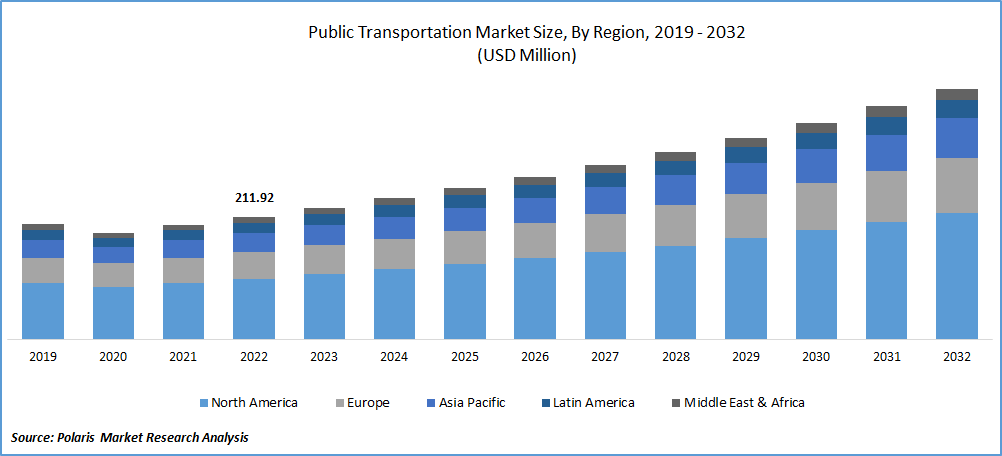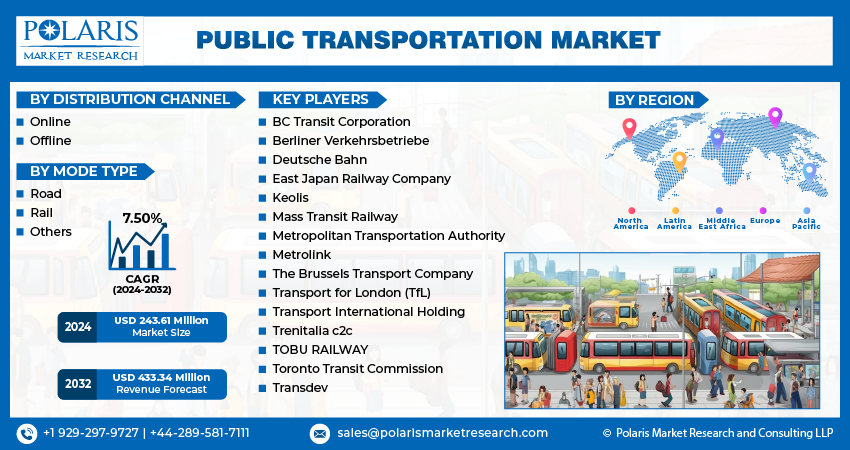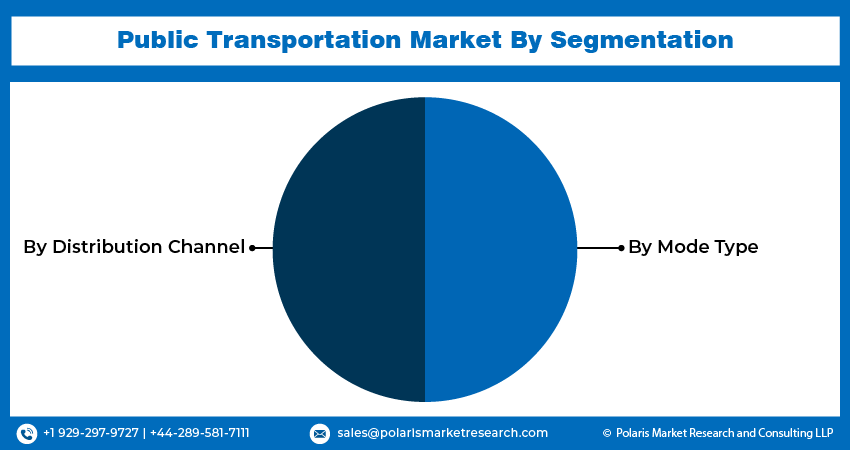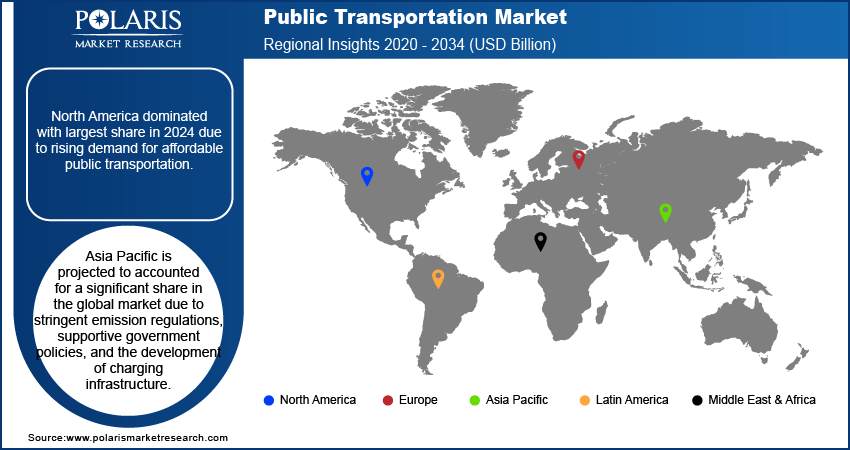
Public Transportation Market Share, Size, Trends, Industry Analysis Report
By Distribution Channel (Online, Offline), By Mode Type (Road, Rail), By Region, And Segment Forecasts, 2024 - 2032
- Published Date:Jan-2024
- Pages: 112
- Format: PDF
- Report ID: PM3607
- Base Year: 2023
- Historical Data: 2019-2022
Report Outlook
The global public transportation market was valued at USD 227.16 million in 2023 and is expected to grow at a CAGR of 7.50% during the forecast period. Traffic congestion is a major global issue due to the increase in private vehicles and urbanization. To address this problem, government authorities and travel agencies are promoting public transportation. Solving traffic congestion requires a multifaceted approach, such as promoting rail and metro systems, integrating urban planning, reforming urban development policies, and implementing intelligent transportation systems. Cities are making significant efforts to enhance public transportation by developing infrastructure, introducing new mobility options, improving travel comfort, ensuring environmental safety, and optimizing freight logistics. By prioritizing public transportation, local authorities can mitigate the impact of traffic congestion on modern roads.

To Understand More About this Research: Request a Free Sample Report
Reducing traffic congestion and implementing government initiatives favor the growth of the market. Governments worldwide are devising strategies to encourage the widespread use of public transportation and prioritize deploying advanced technology, innovative financing options, institutional improvements, and enhancing the overall user experience to attract a larger consumer base toward public transport.
Public transportation in India faces significant challenges due to population growth, rising greenhouse gas emissions, deteriorating air quality, and severe traffic congestion. The government is investing heavily in developing smart cities with advanced public transportation infrastructure. As part of these initiatives, cities must construct efficient public transportation systems, promote urban mobility by fostering walkable localities, and offer various transportation options. This holistic approach seeks to address pressing issues faced by the Indian public transportation sector while creating sustainable and livable urban environments.
The government of India has prioritized integrating hybrid technologies within the public transportation sector. Efforts have been made to convert conventional buses into electric buses through collaborations with KPIT technologies and the Central Institute of Road Transport. This demonstrates the government's significant investment in improving various modes of public transportation and accompanying infrastructure. These proactive initiatives play a crucial role in propelling the public transportation market growth.

Industry Dynamics
Growth Drivers
The cost advantage of using mass transit over owning and operating a car is a significant factor influencing people's preference for public transportation. Recognizing this, local governments actively involve elderly individuals in public transport to alleviate traffic congestion and improve overall public transportation systems. These efforts to engage elderly populations in public transportation contribute to the market's growth. By promoting the benefits of public transit and providing accessible and convenient options for senior citizens, local authorities aim to reduce private vehicle usage and the associated traffic congestion, ultimately enhancing the efficiency and popularity of public transportation services.
To alleviate road traffic congestion, prioritize public safety, and address the adverse environmental impacts of carbon emissions, several governments are actively pursuing various initiatives driving the growth of the global market. Governments across different countries have recognized the significance of allocating budgetary resources toward developing public transportation infrastructure and expanding and constructing new road networks. For example, the Colombian government recently redirected its national transportation budget to assist cities like Bogota and Medellin in enhancing their Bus Rapid Transit (BRT) and metro systems, respectively. These cities collectively serve approximately 300 million passengers on an annual basis.
Report Segmentation
The market is primarily segmented based on distribution channel, mode type, and region.
|
By Distribution Channel |
By Mode Type |
By Region |
|
|
|
To Understand the Scope of this Report: Speak to Analyst
Offline segment accounted for the largest market share in 2022
Offline segment accounted for global market share, in 2022. Many travelers and market participants, particularly in developing nations, rely on offline ticketing channels for public transit. Consequently, the offline distribution channel has captured a substantial market share in the global market. Its continued importance and widespread usage underscore its significant contribution to the growth and success of the public transport industry.
Online segment is anticipated to be the fastest growing segment. The rapid global urbanization has created a pressing demand for enhanced public transportation systems. Currently, around 55% of the world's population resides in urban areas, projected to rise to around 68 per cent, by 2050, adding 2.5 Bn individuals to the urban populations, as per the United Nations. This significant influx of people is placing a strain on transportation and mobility infrastructures in cities that lack adequate public transport options and face safety issues on roads, ultimately leading to traffic congestion. In order to address this challenge, governing authorities are actively implementing digital transformation strategies that encompass the adoption of smart solutions and advanced online platforms. These measures are aimed at mitigating traffic congestion and improving the efficiency of transportation systems within urban areas.

Rail segment is expected to witness highest growth during the forecast period
Over the next few years, the rail transportation industry is expected to experience the highest growth rate. This is because more people seek affordable and reliable long-distance transportation, and rail transport is a fast and dependable option. Additionally, as more people travel between cities and rural areas, the demand for rail transportation increases, resulting in the industry's significant global market share.
To improve efficiency, safety, and sustainability, the rail industry has adopted Advanced Driver Assistance Systems (ADAS), which utilize advanced technologies and intelligent solutions. This allows the industry to address various challenges and achieve improved performance.
The road transportation industry currently has the largest market share due to various factors such as increasing population, expanding transport infrastructure, rising disposable incomes, and improved access to remote areas. Public transportation on roads also benefits the economy by supporting numerous roadside businesses affiliated with service providers. Governments also promote public transport to reduce excessive fuel consumption and mitigate pollution. This, combined with growing environmental consciousness among consumers, is expected to drive the growth of this segment. Overall, the road transport segment is an increasingly attractive choice for commuters.
North America region dominated the global market in 2022
The North American region dominated the global market with a considerable market share. This growth is driven by the rising demand for affordable public transportation solutions due to limited accessibility and high transportation costs in the region. The government has undertaken various investment initiatives to address this issue to provide affordable and accessible transportation facilities.
For instance, the Federal Railroad Administration announced the Consolidated Rail Infrastructure and Safety Improvements grant program in June 2022. With a total value of USD 368 million, this program aims to fund 46 projects across 32 states and the District of Columbia. The investments are focused on modernizing the region's rail infrastructure and supporting supply chains. They are also expected to alleviate congestion and provide affordable regional transit options. These factors collectively contribute to the growth of the public transportation market in the region.
The Asia Pacific region will likely emerge as the fastest-growing region with a healthy CAGR during the forecast period. This is primarily due to stringent emission regulations, supportive government policies, and the development of charging infrastructure. These factors have created a favorable environment for market growth in the region. Furthermore, the increasing pollution levels and the detrimental impact of greenhouse gas emissions on the environment have heightened the demand for environmentally friendly vehicles in the region. To promote green transportation, governments in various countries have implemented tax exemptions and subsidies to purchase electric buses. This initiative has significantly stimulated the manufacturing of electric buses, thereby driving the market growth in the region.

Competitive Insight
Some of the major players operating in the global market include BC Transit Corporation, Berliner Verkehrsbetriebe, Deutsche Bahn, East Japan Railway Company, Keolis, Mass Transit Railway, Metropolitan Transportation Authority, Southern California Regional Rail Authority (Metrolink), The Brussels Transport Company, Transport for London (TfL), Transport International Holding, Trenitalia c2c, TOBU RAILWAY, Toronto Transit Commission, and Transdev.
Recent Developments
- In February 2022, Transport for London (TfL) revealed a partnership with MTR Elizabeth Line and Walker Construction Limited to enhance accessibility and expand facilities at Burnham station. The planned improvements encompass the installation of new ticket vending machines, customer information screens, and automatic ticket gates and constructing of ticket office buildings with accessible ticket windows and automated ticket gates.
Public Transportation Market Report Scope
|
Report Attributes |
Details |
|
Market size value in 2024 |
USD 243.61 million |
|
Revenue forecast in 2032 |
USD 433.34 million |
|
CAGR |
7.50% from 2024 – 2032 |
|
Base year |
2023 |
|
Historical data |
2019 – 2022 |
|
Forecast period |
2024 – 2032 |
|
Quantitative units |
Revenue in USD million and CAGR from 2024 to 2032 |
|
Segments covered |
By Mode Type, By Distribution Channel, By Region |
|
Regional scope |
North America, Europe, Asia Pacific, Latin America; Middle East & Africa |
|
Key companies |
BC Transit Corporation, Berliner Verkehrsbetriebe, Deutsche Bahn, East Japan Railway Company, Keolis, Mass Transit Railway, Metropolitan Transportation Authority, Southern California Regional Rail Authority (Metrolink), The Brussels Transport Company, Transport for London (TfL), Transport International Holding, Trenitalia c2c, TOBU RAILWAY, Toronto Transit Commission, and Transdev. |
FAQ's
The Public Transportation Market report covering key are distribution channel, mode type, and region.
Public Transportation Market Size Worth $ 433.34 Million By 2032.
The global public transportation market expected to grow at a CAGR of 7.4% during the forecast period.
North America is Public Transportation Market.
key driving factors in Public Transportation Market are Cost advantage of using mass transit.
